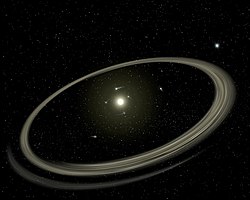
Back Planetensystem ALS نظام كوكبي Arabic Sistema planetariu AST Планетная сістэма Byelorussian Плянэтная сыстэма BE-X-OLD Планетарна система Bulgarian গ্রহ ব্যবস্থা Bengali/Bangla Sistema planetari Catalan سیستمی ھەسارەیی CKB Planetární soustava Czech

A planetary system is a set of gravitationally bound non-stellar bodies in or out of orbit around a star or star system. Generally speaking, systems with one or more planets constitute a planetary system, although such systems may also consist of bodies such as dwarf planets, asteroids, natural satellites, meteoroids, comets, planetesimals[1][2] and circumstellar disks. For example, the Sun together with the planetary system revolving around it, including Earth, form the Solar System.[3][4] The term exoplanetary system is sometimes used in reference to other planetary systems.
As of 24 July 2024, there are 7,026 confirmed exoplanets in 4,949 planetary systems, with 1007 systems having more than one planet.[5] Debris disks are known to be common while other objects are more difficult to observe.
Of particular interest to astrobiology is the habitable zone of planetary systems where planets could have surface liquid water, and thus, the capacity to support Earth-like life.
- ^ p. 394, The Universal Book of Astronomy, from the Andromeda Galaxy to the Zone of Avoidance, David J. Dsrling, Hoboken, New Jersey: Wiley, 2004. ISBN 0-471-26569-1.
- ^ p. 314, Collins Dictionary of Astronomy, Valerie Illingworth, London: Collins, 2000. ISBN 0-00-710297-6.
- ^ p. 382, Collins Dictionary of Astronomy.
- ^ p. 420, A Dictionary of Astronomy, Ian Ridpath, Oxford, New York: Oxford University Press, 2003. ISBN 0-19-860513-7.
- ^ Schneider, J. "Interactive Extra-solar Planets Catalog". The Extrasolar Planets Encyclopedia. Retrieved July 24, 2024.